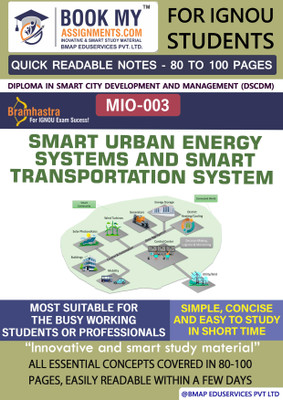IGNOU MIO 003 Smart Urban Energy Systems and Smart Transportation System Study Guide (Quick Readable Notes) for Ignou Student.(Paperback, BMA Publication)
Quick Overview
Product Price Comparison
IGNOU MIO 003 (Smart Urban Energy Systems and Smart Transportation System) involves condensing key concepts, strategies, and technologies related to smart urban energy systems and smart transportation. Here's a structured approach to help you create your own notes:Introduction to Smart Urban Energy Systems:Define smart urban energy systems and their role in optimizing energy production, distribution, and consumption in urban areas.Discuss the importance of integrating renewable energy sources, energy-efficient technologies, and smart grid infrastructure in smart cities.Components of Smart Urban Energy Systems:Summarize the key components of smart urban energy systems, including renewable energy sources (solar, wind, hydro, etc.), energy storage systems, smart meters, and demand-response technologies.Explain how these components work together to improve energy efficiency, reliability, and sustainability in urban environments.Renewable Energy Integration:Discuss the challenges and opportunities associated with integrating renewable energy sources into urban energy systems, such as intermittency, grid stability, and regulatory frameworks.Explore innovative solutions and best practices for maximizing the penetration of renewables and reducing dependence on fossil fuels in smart cities.Energy Management and Optimization:Explain the concept of energy management and optimization in smart urban energy systems, including demand-side management, load balancing, and peak shaving strategies.Discuss the role of advanced analytics, machine learning, and predictive modeling in optimizing energy consumption and reducing costs.Smart Grid Infrastructure:Define smart grid infrastructure and its components, including advanced metering infrastructure (AMI), distribution automation, and grid-edge technologies.Discuss the benefits of smart grids, such as improved reliability, resilience, and integration of renewable energy resources.Energy Storage Solutions:Explore different energy storage technologies used in smart urban energy systems, such as batteries, flywheels, pumped hydro storage, and thermal energy storage.Discuss the role of energy storage in enhancing grid stability, supporting renewable energy integration, and providing backup power during outages.


